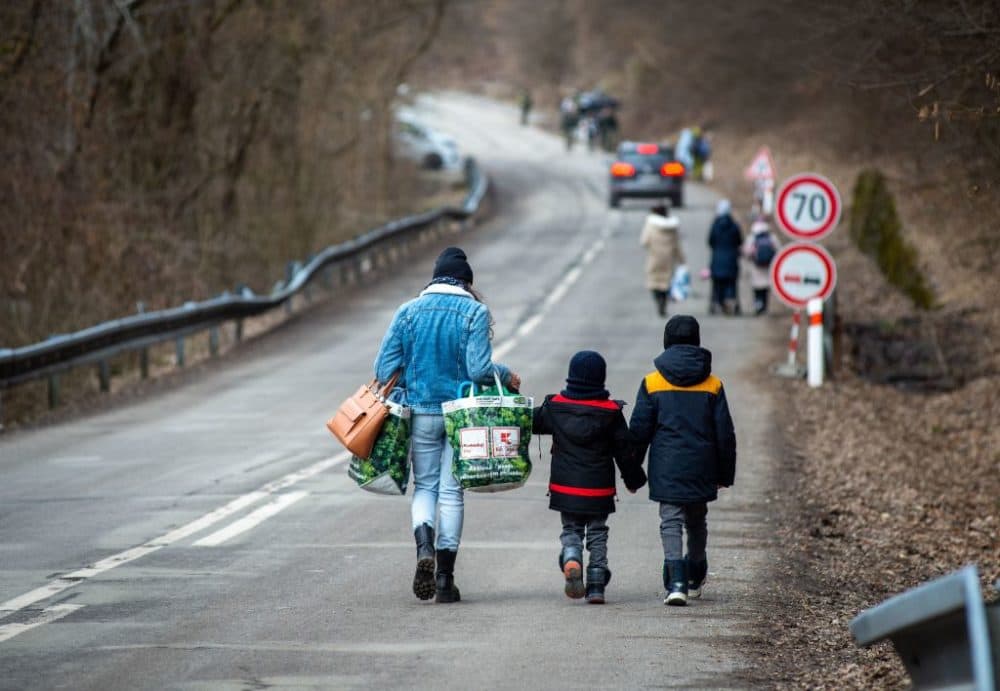Beatrix Csaba – Szubjektív Magazin, MUOSZ
On February 24, 2022, European history in the 21st century reached a new turning point. The outbreak of the Russian-Ukrainian war drastically altered the political and military landscape in a region where people had lived in peace for decades. Most individuals learn about war from history books or news reports, with these conflicts often unfolding far from their own lives. However, it’s not unprecedented for a military conflict to erupt right next door to Hungary, leading to significant loss of life. Between 1991 and 1995, the Yugoslav Wars brought a similar situation to our doorstep. Back then, Hungary was neither a member of the European Union nor NATO, and the country was still emerging from the internal political transformation known as the regime change.
The current situation is different, given that Hungary is now an EU member state and a full NATO ally, situated directly adjacent to a war zone. However, rather than focusing on the political dynamics or potential military obligations tied to NATO membership, we want to highlight the importance of humanitarian aid.
Since the beginning of the war, a large number of refugees have fled Ukraine to Hungary. Statistics show that over one million Ukrainian refugees have entered Hungary. Although most have moved on, around 65,000 people have sought refuge in Hungary over the past two years, and the numbers continue to rise.
The Hungarian government, along with numerous civil organizations, has made efforts to assist those forced to abandon their homes and former lives. Few anticipated that this military conflict would extend far beyond a few months, evolving into a protracted stalemate. The truth is, the war has been ongoing for more than two years, and there is still no clear end in sight. No one knows when people will be able to return to their homes—or to what remains of them—and when and how the rebuilding process might begin.
For those who have never experienced anything similar, it’s almost impossible to imagine what it feels like to lose everything in a single moment. These refugees didn’t just leave behind their homes, possessions, and familiar lives. The human toll—the loss of family members, relatives, friends, and acquaintances—leaves deep, often permanent, emotional scars. These refugees arrived carrying life-deficits that are incredibly difficult to overcome. Perhaps those who have relatives or friends in Hungary or Western countries, offering them temporary safety, are somewhat more fortunate. Yet, they too bear the trauma of their loss.
The situation for many Ukrainian war refugees is bleak. Some were already in a difficult situation before the war began, yet found solace in their own communities and surroundings. For them, this loss of stability is even more significant than for those in better circumstances. Building a new life on their own is nearly impossible. The EMMA Association’s humanitarian program has been working to help this group over the past period. Two of the association’s workers, Anna Nada Péter and Annamária Sárdi, shared their experiences with us.
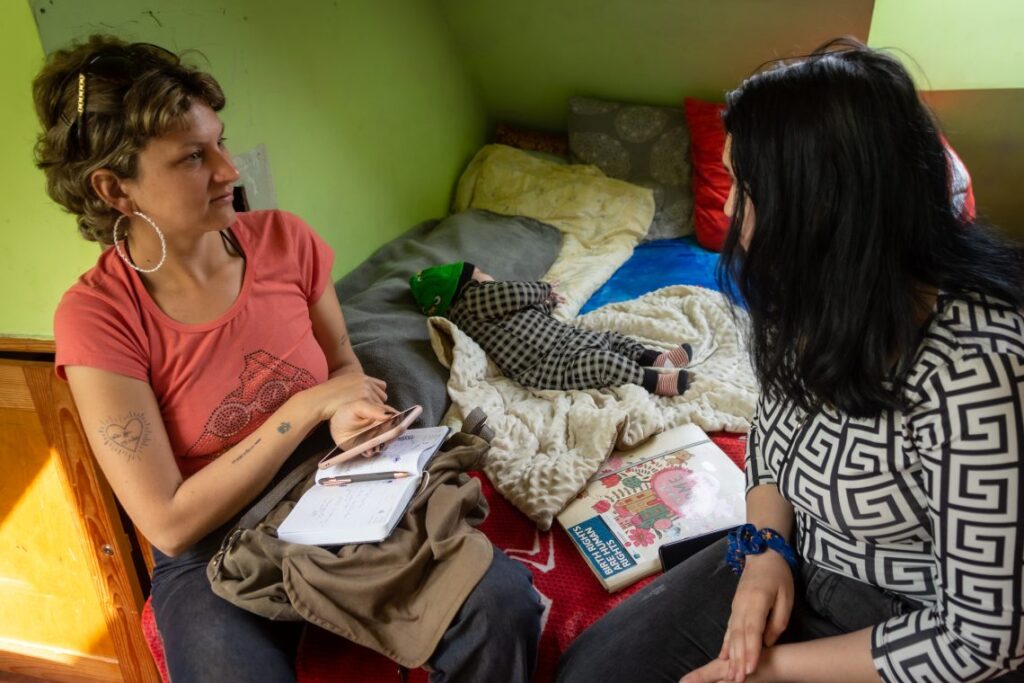
Péter Anna Nada, employee of the EMMA Association, photo: Gabriella Csoszó
What kind of help was most needed?
Annamária Sárdi: The first priority was to address the refugees’ basic needs: they required food, safe housing, and medical care. EMMA Association is a national women’s organization dedicated to fundamental women’s rights and social equality, with a particular focus on the periods of childbirth and child-rearing. Naturally, in this humanitarian crisis, we concentrated on supporting pregnant women and mothers with young children.
We provided psychosocial support to the refugees and helped them navigate the Hungarian maternity care system. As we realized the many challenges they faced, it became necessary to accompany them to healthcare institutions to ensure they received the care they needed through our advocacy efforts. In cases where there was no common language between the patient and healthcare staff, interpretation services were required. Although, for example, the 1812 health hotline offers free interpretation services for healthcare workers, this option was often underutilized, which could have prevented many communication issues.
There were also challenges within the healthcare system regarding how to handle Ukrainian citizens and those with dual Ukrainian-Hungarian citizenship. Although the legal framework was in place, on an operational level—in clinics and hospitals—many were not familiar with these regulations. Frequently, issues arose because refugee women lacked personal identification, health insurance cards, or official permanent addresses. This led to significant administrative difficulties, even when booking appointments.
Beyond these issues, the process of registering the births and nationalities of newborns born to foreign mothers is both costly and complex, and we had to provide assistance with this as well. Not to mention the financial support claims after childbirth, which also required our help. This situation was further complicated by the fact that many of those we supported, within our means, were Roma families coming from extreme poverty. While we encountered many with a helpful attitude, there were also numerous instances where they faced unpleasant, discriminatory treatment.
Anna Nada Péter: Bureaucratic difficulties were particularly pronounced for those with dual citizenship. For Ukrainian refugees, their situation was clearer to officials. However, those with dual citizenship faced different treatment. They did not have either a refugee status number or a health insurance number, making their registration particularly problematic. Additionally, the lack of a fixed address often hindered the organization of care, as these families had to move multiple times as their housing situations changed. Those placed in refugee shelters faced difficulties with transportation, as these shelters are often far from healthcare centers.
For refugees living in extreme poverty, another challenge was navigating Hungary’s well-organized child protection system, which the Ukrainian refugees were unfamiliar with. For families from such impoverished backgrounds, particularly with newborns, child protection considerations posed new challenges. They were deeply concerned about the possibility of their children being taken away due to their living conditions. These are not everyday problems, especially when dealing with women and families who are already in traumatized situations. Keeping their spirits up and helping them organize their daily lives is truly a significant task.
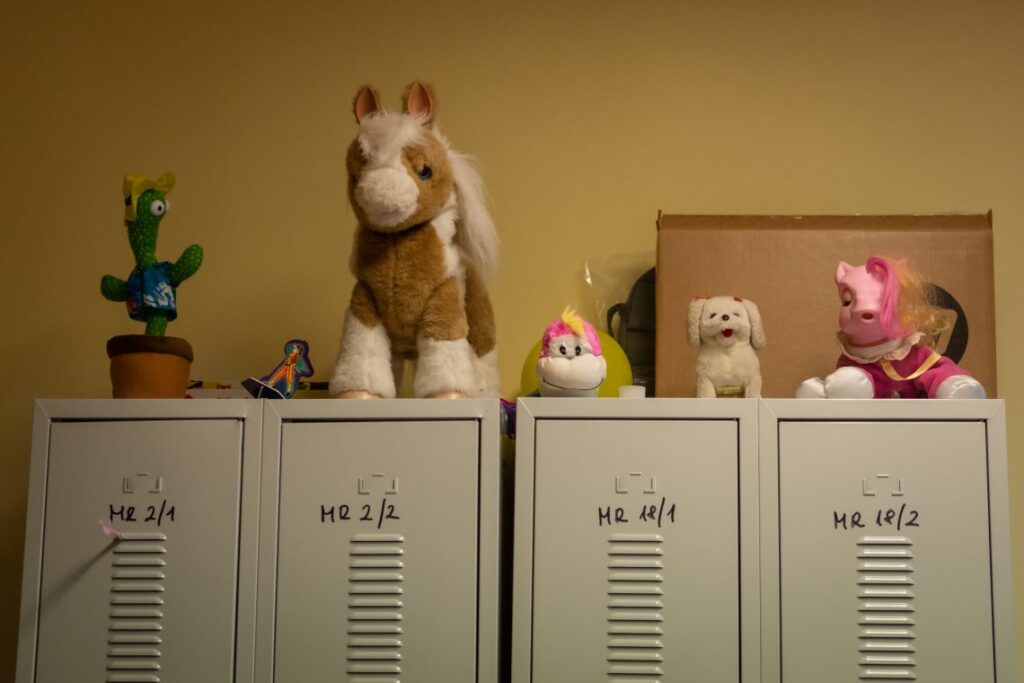
How many people has EMMA Association helped?
Annamária Sárdi: Over the past 12 months, we have provided comprehensive support to around 150 women. In the previous period, we were able to assist a similar number of women, but not always with the level of comprehensive help we’ve managed to offer in the last year. Initially, our support sometimes consisted of only a few informational meetings. In total, we have directly provided comprehensive assistance to approximately 300 women. When considering the entire program and its outreach, we can say that over the two years, we reached around 1,000 individuals in some form. This includes women who received hygiene products, such as menstrual pads, which were often difficult for them to obtain during organized donation distributions.
What does comprehensive case management entail?
Annamária Sárdi: For pregnant women, this meant ensuring they received proper care—connecting them with midwives, gynecologists, and accompanying them to medical appointments. We provided psychosocial support and a stable background up to the point of delivery. If needed, we also arranged for a doula to accompany them during childbirth, so they wouldn’t be alone. Additionally, we assisted with the birth registration process. When a Ukrainian citizen gives birth in Hungary, the involvement of the Ukrainian embassy is necessary to secure the newborn’s Ukrainian citizenship. We were also there for them during the postpartum period, providing material donations to help care for the newborn. We helped with contraception for those who did not want to have another pregnancy at that time. We even encountered cases where women were in abusive relationships, and in such situations, we worked with partner organizations to ensure they found safe accommodation and received the necessary professional support.
Anna Nada Péter: Due to anomalies in the healthcare system, we had to advocate strongly for those with dual citizenship, as their access to healthcare was the most difficult. Securing maternity support for them also proved problematic. It seems unlikely that a resolution to the conflict will be found in the short term. This means that solutions must be found for families for an indefinite period. What future can be predicted for those coming from extreme poverty and already disadvantaged backgrounds?
Anna Nada Péter: We worked mostly with Roma families from Transcarpathia. Due to their low levels of education, their employment opportunities in Hungary are severely limited. When you also consider that their housing situation is very unstable, it’s not hard to predict that this will further disadvantage them in securing a livelihood and maintaining family life. In the locations where most were housed, job opportunities are scarce. This means that the men in these families are forced to seek work elsewhere, leading to the separation of already strained families. The men incur additional costs for accommodation, as housing is not free for them. Only those caring for young children or the elderly receive support. This leaves women and children on their own, significantly reducing their prospects. The outlook for their children is even bleaker, whether in terms of education or experiencing family security. Child protection services are not available to those with refugee status due to the lack of a health insurance number. The situation for children is very precarious. Some districts in Budapest are trying to help these families, but there is no effective strategy or action plan, let alone adequate financial resources, to provide life solutions. State support is also continuously shrinking.
EMMA Association may have taken on the most difficult task by trying to support those who were already living in extreme poverty and disadvantaged circumstances in Ukraine and are now among the most vulnerable as refugees in Hungary. This situation is further complicated by the fact that we are speaking in the past tense, as the funding for the humanitarian program based on comprehensive case management ended on April 30, 2024. This means that these people are now even more on their own.
What is the reality for their future?
Anna Nada Péter: Before the war, housing for women and families in Ukraine was secure. Although most men already commuted to work in Hungary, they were reassured by the knowledge that their families were relatively safe. Women and children lived within their own communities. The security of housing and community is what has been lost due to the war. They are now in a situation of complete dislocation and have no sense of future prospects.
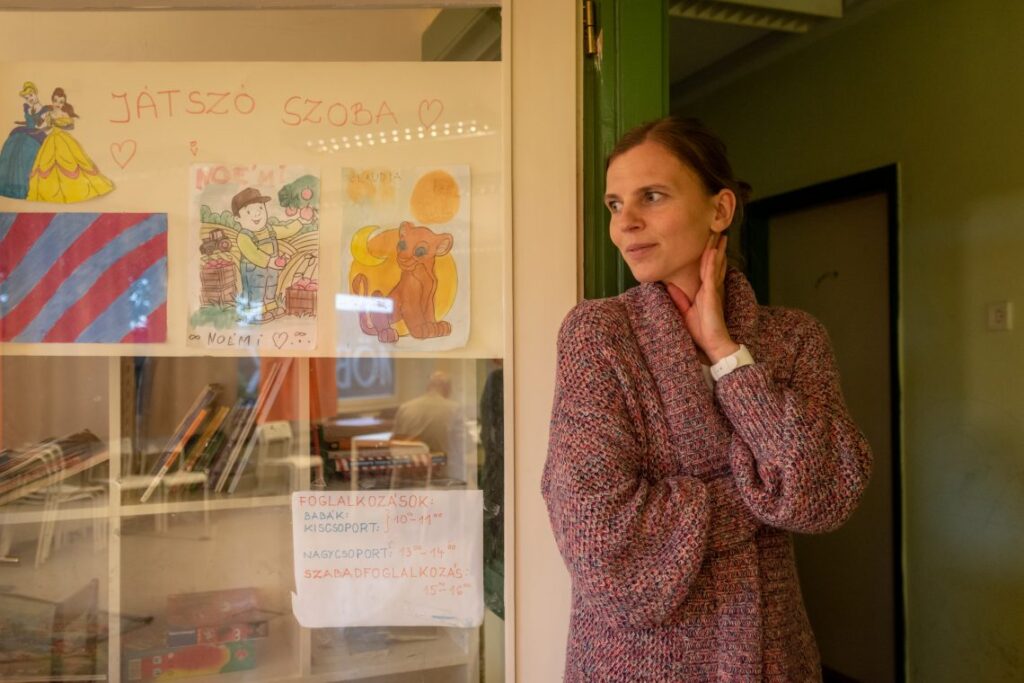
Sárdi Annamária, EMMA Association Member, Photo by Gabriella Csoszó
Sárdi Annamária: The funding for the project allowed us to provide active, on-the-ground assistance to families. Unfortunately, we cannot continue this in the same way now. However, those affected are not completely left on their own. Thanks to a supporter, we have not entirely disappeared from the humanitarian field. We can still provide information about the national maternity care and obstetric systems, the registration process for newborns, and available financial support. On Wednesdays, people can visit our office in person, although this service is limited to those living in Budapest and its immediate surroundings. For those living farther away, we are available by phone and email. Additionally, we have prepared informational materials that we can distribute, and we have also created a YouTube video series containing useful information for women. These videos cover topics such as accessing healthcare, the registration process for newborns, and the financial support they can apply for.
Sárdi Annamária: We have not only created informational materials for refugee families but also aimed to support social workers and other professionals involved in this field to continue effectively aiding women in difficult situations. However, the comprehensive case support work we conducted over the past two years is unfortunately not possible to continue at this time.
Families in institutional shelters are relatively better off regarding housing. There are refugee shelters in Debrecen and Budapest, which, although not ideal, offer relative safety. The situation is much bleaker for families who must secure their own housing and livelihood independently.
Families facing complete uncertainty in terms of space, time, and perspective are dealing with extraordinary challenges. For women, particularly pregnant ones, emotional support is crucial, as they need it during pregnancy, childbirth, and the postpartum period.
How accepting is Hungarian society towards refugees?
Péter Anna Nada: It is no coincidence that Ukrainian refugees with connections to other countries have sought to move on as quickly as possible rather than staying in Hungary. Here, primarily those in the most hopeless situations, coming from deep poverty, remain, with few solutions available to them. Even though there are shortcomings in addressing the living conditions of those in deep poverty in Hungary, the current refugee status in Hungary is still safer for the Roma families from Transcarpathia compared to their previous situation. Nonetheless, a long-term resolution for these families’ lives remains elusive. The state needs to take more decisive responsibility, and there is also room for improvement in social responsibility. Civil organizations could do more if they had stronger support and adequate resources. Humanitarian organizations are also starting to give up, as EU funding is running out and the options for providing concrete help are becoming increasingly limited.
Sárdi Annamária: The acceptance of Roma refugees is further complicated by their living in refugee shelters that are far from the city center, leading to a form of segregation. They are among the most vulnerable, with preschool and school-aged children being the primary contacts with the local community. We do not see a comprehensive integration strategy. The lack of funding means fewer organizations are involved in providing assistance, which exacerbates the refugees’ sense of hopelessness and vulnerability.
What happens to these families if all support runs out?
Sárdi Annamária: No one can answer this question definitively at the moment. Families in disadvantaged situations, especially those with many children who have fled war zones, will struggle or may not be able to survive without support. Finding rental housing with their background is extremely challenging. If refugee shelters are discontinued, their chances of survival without professional and financial support are very slim. They will need substantial advocacy support to start independent lives.
What mental resources do the EMMA Association staff provide in this critical situation?
Sárdi Annamária: Safety is essential for everyone, whether adults or children. The support and presence we could provide through comprehensive case management offered some stability. It alleviated their sense of abandonment while also helping with navigating issues related to pregnancy, childbirth, and the healthcare and administrative systems. We assisted in asserting their rights and provided a network of contacts, social support, and mental health conversations, all of which served as support for them. These women have essentially lost their personal autonomy. Even if they speak Hungarian, their usage of language and expressions differ significantly. They often struggled to communicate effectively in Hungarian and navigate official procedures. Despite encountering many who offered help, they frequently faced misunderstanding and rejection.
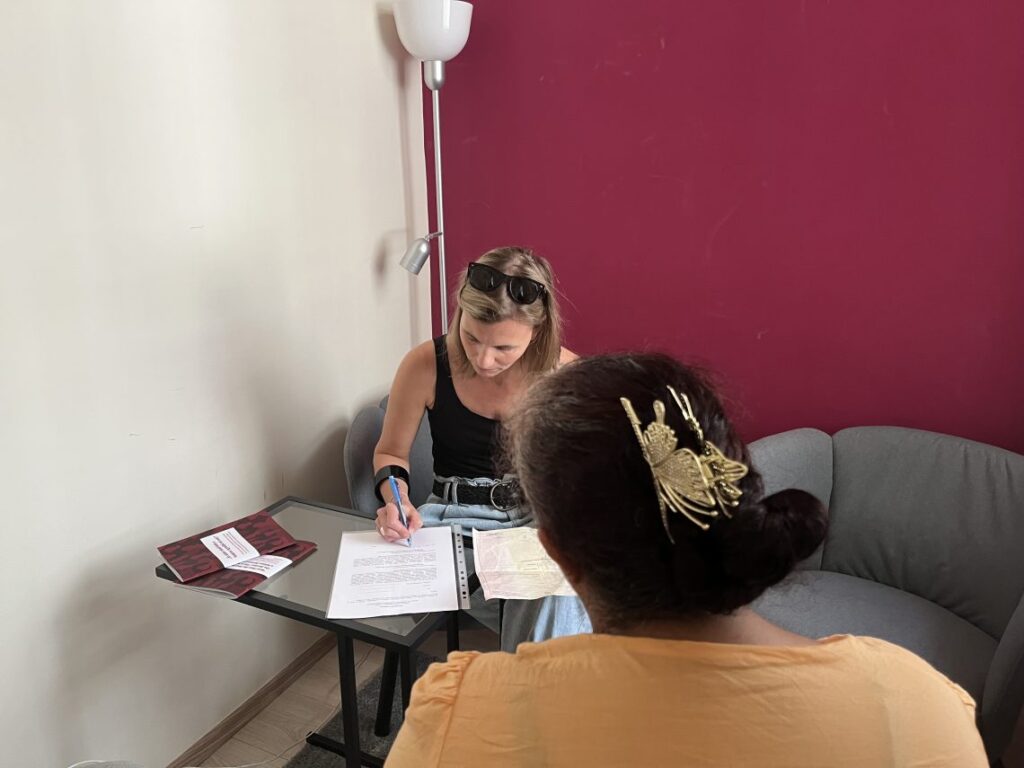
Sárdi Annamária az EMMA Egyesület munkatársa, forrás: EMMA Egyesület
How significant is mental and emotional support as a form of assistance?
Péter Anna Nada: Tolerance, patience, and a helpful attitude can only alleviate the constant anxiety to a certain extent. Nevertheless, this support is crucial for refugees. People often cannot fully grasp what these families are experiencing. Therefore, it was especially important for us to stand against discrimination and do everything possible to ensure that, at the very least, housing and daily sustainability are addressed as much as possible. We aimed to ensure that the healthcare system accepts women and pregnant individuals and that educational institutions accommodate the children. Integration programs primarily provide solutions for middle-class refugees. For families coming from deep poverty, low qualifications, and pre-existing disadvantages, we were able to provide support in the forms mentioned over the past two years. However, long-term solutions are still needed.
No one can predict when these families will be able to return to Ukraine. It is uncertain how long they will have to endure their current physical, emotional, and mental conditions. Moreover, it is unclear how and when they will be able to rebuild their lives upon returning home.
